 | « Back to article | Print this article |
India's national security strategy needs to be revised periodically since the global and regional geopolitical situation is dynamic, points out Commodore Venugopal Menon (retd).

It is a known fact that the Indian National Security Council has been in existence since 1999 and yet the government has not formulated an official document outlining a National Security Strategy for India.
One of the main reasons attributed to the reluctance on the government's part could be the lack of political consensus and secondly the inability to address the issue of coordination required to formulate and address the issues of national security.
Although we have managed to tackle external aggressions, internal security challenges, and national calamities thus far without a concise document, the new security challenges and geopolitical canvas in our region is rapidly changing necessitating an urgent need for a concise national security strategy.
The absence of a coherent strategy can result in ad hoc measures and a reactive approach which could prove costly.
This can happen only if the government of the day can build political consensus in order to formulate a document spaced for a medium-term which should be more than the tenure of the Government.
A short-sighted document covering the tenure of the government may be an easy way out but will not be in the best interests of the country.
A cogent and comprehensive national security strategy doctrine for the country should take into account not only the external and internal security environment and their interlinkages and implications but also the constitutional, political, social, economic, financial, scientific, technological and commercial dimensions of national security.
Grand Strategy
A Grand Strategy is important for every nation which in essence would be the beacon or a path to be followed to achieve the desired objectives.
Needless to say, a country's economic policy, domestic policy, foreign policy, and ecurity strategy should flow out of the Grand Strategy which in simple terms is the long term vision of any nation.
A Grand Strategy gives a broad guideline to successive governments regardless of their political agenda and it is also essential that these policies are not affected drastically by change of guard.
It is also pertinent to add that the Grand Strategy is not a rigid document and may need course corrections with change in times and the country's priorities.
All the components of the Grand Strategy are interlinked and should not be seen in isolation.
Broad Elements of National Security Strategy
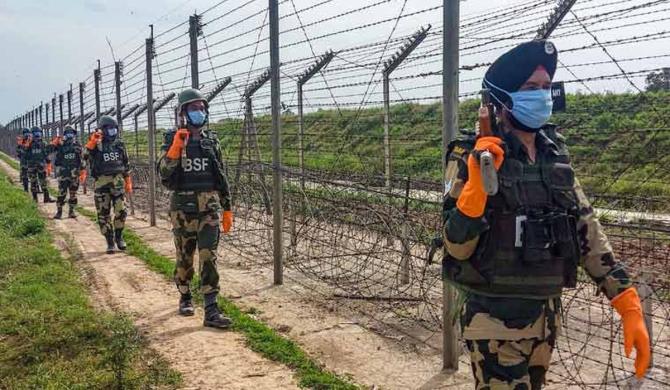
Geopolitical Canvas
Although I would not categorise South Asia as a volatile region, it has its share of uncertainties caused by the rise of China, instability in Pakistan, terrorism and asymmetric warfare, the extent of engagement by China in the Indian Ocean region through their BRI projects and last but not the least the future of Afghanistan post-withdrawal of US troops.
These aspects are beyond our control and hence there is a definite need for a counter-strategy to meet the challenges.
China
The fact that China shares a long land border with India is a geographic factor that cannot be changed.
It is also important to note that China considers India as a challenger to its supremacy in the region.
A pragmatic approach to deal with China is through continuous and sustainable diplomatic engagement to resolve issues of contention to bring about normalcy.
An arms race to counter the Chinese juggernaut would only incur heavy costs and drain the coffers.
At the same time, we should ensure and maintain credible deterrence levels at the border to thwart any border incursions by China.
In my view, it may not be desirable to join alliances with other nations to counter China since the issues are solely bilateral.
Such alliances would at best provide diplomatic support to our stand on contentious issues.
More importantly, India needs to revive SAARC, rejuvenate BIMSTEC and revitalise the Indian Ocean Rim grouping to extend our influence and gather support from the countries in the region.
A unified region under an Indian umbrella would be an effective counter to Chinese hegemonic intent than any loose alliance with extra-regional powers.
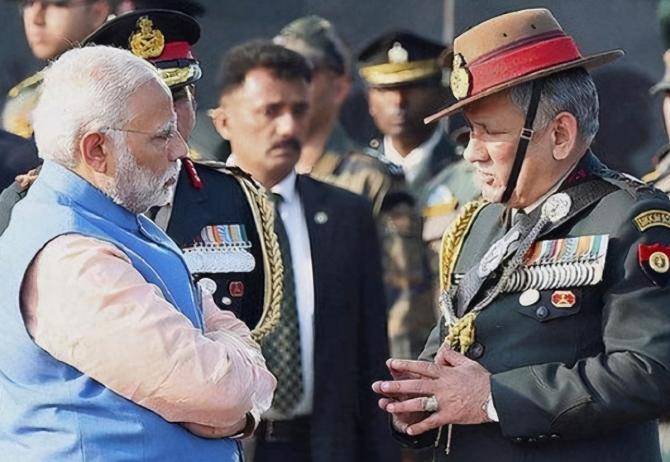
Pakistan
The situation in Kashmir has improved considerably post revoking of Article 370 and we need to follow it up with additional measures to bring about total normalcy in the state.
The need of the hour is to provide good governance, regain people's confidence, invest in infrastructure, health care, education, and setting up of administrative machinery.
Successful implementation of these steps would ensure that Pakistan's influence in the valley would ultimately wane off which should be our main objective.
As far as infiltration from across the border, we should continue with our policy of hot pursuit and surgical strikes to maintain a deterrent factor.
Needless to say, there cannot be any compromise on our state of alertness on the border.
Diplomatic engagement with Pakistan should be attempted when normalcy returns in order to resolve contentious issues.
Afghanistan
US withdrawal from Afghanistan would create a vacuum in that country from a security perspective.
A Taliban takeover cannot be ruled out.
The waters look murky at the moment and it would be advisable to wait and watch as the situation evolves.
Any decision to assist in rebuilding infrastructure in that country should be cautious and attempted only after the government in power settles down towards normalcy.
Another factor to be considered is the extent of Pakistan's influence in the new Government.
We should avoid any misadventures of putting boots on the ground to augment security or control situations arising out of clashes between rival factions of Taliban fighting for power.

Internal Security
Internal Security is an important aspect that has to be addressed in the NSS document.
It should include left-wing extremism, Kashmir, the North East, communalism, religious fundamentalism, and socio-economic inequalities.
Most of these problems have resulted over years of neglect in affected regions.
These issues have to be dealt with a strong political will and within the democratic framework of the Constitution.
Adequate attention has to be paid to the region's sensitivities and aspirations.
An effective counter-terrorism strategy encompassing intelligence reforms, police reforms, legal reforms, clear rules of engagement with insurgents, militants, and terrorists should be adopted.
Pandemic management in India is a weak area as indicated by the spread of COVID.
There is an urgent need to take a relook at the National Disaster Management Act of 2005 and the archaic Pandemic Management Act of 1897 with the aim of clearly defining the roles of the centre and the states to effectively manage pandemics of this nature.
The composition of NDMA also warrants a relook to include domain specialists from the medical fraternity and representatives of the key ministries instead of making it exclusively a post-retirement avenue for retired bureaucrats and military veterans.
Border Management
Border management is a neglected area that should be given high priority.
An effectively regulated border that discourages illegal movement but facilitates people to people contacts is necessary.
Modern technology in border management with an effective command and control system is to be adopted.
Visa regime and immigration policies need to be overhauled to avoid bureaucratic delays.
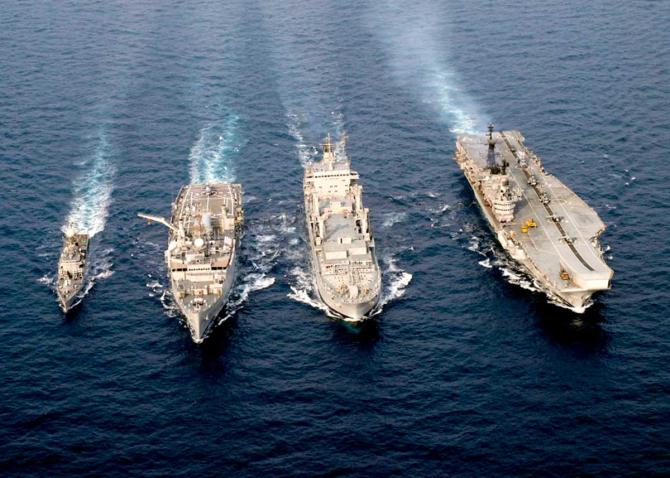
Maritime Security
There is a need to get out of our land border centric security threat perception and include the maritime domain in the overall security paradigm.
This should include coastal security and our area of interest in the Indian Ocean as well.
Various measures were instituted post the Mumbai seaborne attack to enhance coastal security.
These measures are still 'Work in Progress' and needs to be completed expeditiously.
Security Imperatives for India in the Indian Ocean Region
India has several security imperatives in the Indian Ocean region.
First, the Indian Ocean represents a key space for the defence of India against potential threats that may emanate from or through the region.
Second, control of the region provides the ability to control the sea lines of communication that cross the eastern seaboard and enter the Pacific Ocean through the Malacca Straits, which would provide India with a bargaining chip in dealing with her rival powers, particularly China.
Third, the area has numerous security issues posed by non-state players that may directly threaten India's interests or otherwise require it to act as a regional maritime security provider.
It is also important to define our area of interest clearly.
Considering our maritime capabilities, it is pragmatic to define the ocean area from the strait of Hormuz to Malacca strait as our area of interest and our maritime strategy should be shaped accordingly.
Net Security Provider
Geostrategic location of India in the Indian Ocean makes it an important player in the region for taking initiative and being the first responder to crisis situations.
The strategic significance of India is prominent because of its geographic transitional position in the middle of the ocean trade routes interconnecting the Atlantic and Pacific Oceans, and also because of India being the major regional naval power with the potential to provide safety and security to trade in the region
Economic factors
A strong economy and inclusive growth should form the basis of the NSS.
Sustained maintenance of economic growth would give India a huge strategic advantage as it will strengthen its hard and soft power to increase Government's policy options.
In the absence of a strong economy, the NSS would come to a naught.
Diplomacy
In an era of knowledge, communications and technology, there is no issue that is not resolvable by dialogue and negotiations and the use of force to achieve the nation's objectives should be the last resort.
Towards this, diplomacy plays a key role in our security strategy and our diplomatic resources need to be expanded and strengthened.
More diplomats, more training and more synergy with resources outside the Government's resources will be needed.
It is also important that we focus primarily on our neighbourhood including Middle Ease and IOR countries which has a direct impact on our security.
This should be followed by the near neighbourhood -- the Central Asian Republics and ASEAN countries -- which would impact us indirectly.
Our policy of strategic economy has been time tested and there is no requirement of taking a relook at that policy.
Balancing of relations between the US, Russia, and China would be the biggest diplomatic challenge for the foreseeable future.
In essence, our foreign policy should be shaped primarily on our national interests and not dictated by changes in geopolitical dimensions or big power competition.
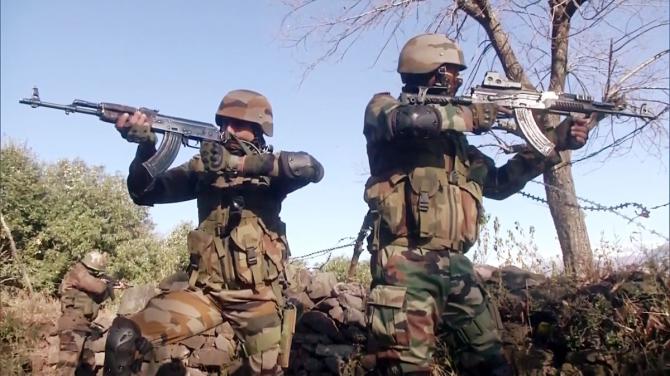
Capacity building & Indigenization
Technology will underpin many of our strengths and in this regard, indigenization holds the key for the future in order to be self-reliant in strategic sectors including space, high-end defence technologies, agriculture, manufacturing, information technology, nuclear power, clean and green technologies etc.
Focus on R&D should be given adequate thrust to achieve these goals.
In addition to providing employment, it would build national strengths and position India high in the global order.
The advances in science and technology should aim at creating high skilled human resources in the country.
These measures would warrant that the education system needs to be overhauled to meet the technological levels of tomorrow.
Military Strategy
Military strategy flows out of the NSS and should clearly lay down the threat perceptions which in turn should determine the assets required to achieve the objectives.
The CDS organization has been created to improve synergy between the three services and optimize resources to achieve high level of preparedness to counter external threats.
It is important that the structure of this organization and its role be deliberated at length to achieve its objectives.
Course corrections would be required till the outfit matures to take its shape.
Quick-fix solutions or emulating a structure followed in other countries to complete a mandate could prove counterproductive.
There is a definite need to focus on the maritime domain which has been neglected for decades since the ocean is the lifeline for our trade and energy security.
Cyberwarfare and Special operations are key facets of modern warfare and we need to incorporate these vital aspects in our military strategy to counter future threats.
Modernization of military doctrines is also a key factor in view of the indispensable role of military power in buttressing the nation's ability to defend itself against armed aggression or insurgency.
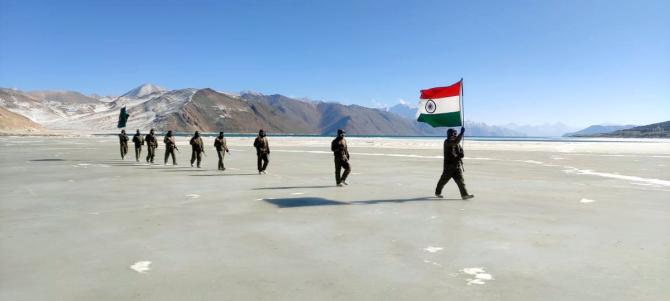
Nuclear Policy
The fundamental purpose of India's nuclear weapons is to deter the use and threat of use of nuclear weapons by any state against the country.
India's stated policy of No First Use is well deliberated over the years and hence requires no change.
Our nuclear command and control system needs to be robust, have stringent checks & balances and measures in place to counter cyber warfare.
It is also important that the nuclear triad is credible enough to maintain stated deterrence levels and should be able to respond with punitive retaliation should deterrence fail.
National Security Council
India has a robust National Security organisation set up by Brajesh Mishra, the first naional security adviser in 1998.
The existing three-tier organisation of the Strategic Policy Group, the National Security Advisory Board and a Joint Intelligence Committee needs no change.
In the ultimate analysis, the best and lasting security, both national and global, comes only from harmonious and peaceful co-existence of nations.
Security strategies and associated policies should thus have peace and goodwill as their goals.
This will also ensure that the nation's scant resources are put to maximum use towards its economic growth and development whilst maintaining credible military deterrence levels simultaneously.
It is important to underline that a National Security Strategy should be realistic and balanced.
It should flag all major issues concerning security strategy and provide guidelines to concerned agencies to work out suitable action plans.
Most importantly, the National Security Strategy needs to be revised periodically since the global and regional geopolitical situation is dynamic.
Commodore Venugopal Menon served in the Indian Navy for 29 years in operational roles, including commands at sea, and training and staff assignments at Naval HQ.
In addition to the staff and war courses in the Indian Navy, he underwent the executive course at the Asia Pacific Centre for Security Studies, Honolulu.
Post retirement he worked in Oman as the head of operations and logistics for a shipping company.
Feature Presentation: Rajesh Alva/Rediff.com